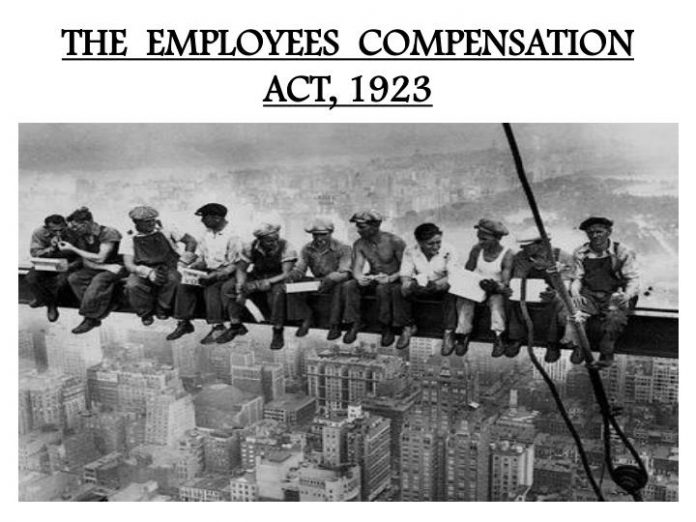This article is written by Lokesh Bagra a Management Trainee HR, Deendayal Port Authority pursuing a Diploma in Labour Employment and Industrial Laws for HR Managers. This article has been edited by Ojuswi (Associate Lawsikho).
This article has been published by Sneha Mahawar.
Table of Contents
Introduction
The Employees Compensation Act,1923 is the first social security measure undertaken in India to provide workmen and their dependents relief for injury by accident resulting in either death or disability. According to the theory of notional extension of employment, a fictitious employment extension is a presumptive or imaginary extension of an employee’s working time under certain circumstances in order to enjoy temporary benefits under various laws by the employer. The employer is liable in certain circumstances for the injury caused to his workers even when he is away from the premises at the time of the accident. The objective of the article is to enlighten the reader with a detailed understanding of the Theory of Notional Extension through various case laws, important sections of the act and the Doctrine of Added Peril.
Applicability of Act
The Act applies to factories, mines, plantations, transport, establishment, construction works, railways, other hazardous occupations and employment as specified in Schedule II. Establishments which are covered under ESI Act, 1948, are kept outside the purview of this Act because the same benefit is provided under ESI Act, 1948 for disablement and death to the workmen and their dependents.
Eligibility
Every worker (including those employed through a contractor) who suffers any injury due to an accident arising out of and in the course of his employment, shall be entitled to compensation under this Act. There is no wage limit for a worker for becoming eligible for compensation under the Act. However where the monthly wage of a worker is more than Rs.4, 000 is taken to be only Rs.4, 000 for calculating compensation either in case of death or permanent total disablement.
Section 2 (1) (m) of the workman Compensation Act defines wages as any privilege or benefit which is capable of being estimated in money, other than a travelling allowance or the value of any travelling concession or a contribution paid by the employer of an employee towards any pension or provident fund or a sum paid to an employee to cover any special expenses entailed on him by the nature of his employment.
Benefits included in the wages are –
- Free accommodation;
- Cleanliness allowance;
- Overtime pay;
- Benefits in the form of food and clothing;
- Bonus;
- Dearness allowance;
- Value of any other concessions, benefits or privileges capable of being estimated in money.
Section 3 Employer’s Liability for Compensation – A workman is entitled to receive compensation from the employer in the following circumstances:-
A. In case of an accident;
B. In case of occupational disease;
C. The said accident or disablement has arisen out of and in the course of employment
In Indian News Chronicle v. Mrs Lazarus, an employee during the course of his employment had to frequently go to the heating room from a cooling point and died because of pneumonia. The court stated that the injury was caused by an accident in the instant case and isn’t considered to be a physical injury as the injury caused was because of his nature of work and concluded that the heir of the deceased employee will be entitled to compensation of Rs 3,500 as the deceased was drawing Rs. 150 per month and in accordance with the schedule IV of the workmen’s Compensation Act.
In C. Manjamma & Anr. Versus The Divisional Manager The New India Assurance Co.Ltd. 2022, the deceased employee was 30 years of age; he was engaged as a driver on the auto-rickshaw; and he expired while on duty because of cardiac arrest, which he suffered due to the strain and stress of his job. In this case, the judgement passed by the High Court of Karnataka and Labour Officer and Commissioner for Workmen’s Compensation had awarded compensation in the sum of Rs. 4,15,960/-(Rupees four lakh fifteen thousand nine hundred sixty) together with interest @ 12% per annum to the wife and mother of the deceased workman. This award of the Labour Officer and Commissioner for Workmen’s Compensation was challenged in the apex court and after examining the facts of the case the honourable supreme court restored the judgement passed by the High Court of Karnataka and award of the Labour Officer and Commissioner for Workmen’s Compensation.
Conditions under which the employer is not liable to pay compensation
- if any injury not emanating in the total or partial disablement of the workman for a period exceeding three days;
- in respect of any injury not causing death, by an accident which is directly attributable to –
(i) the workman having been under influence of drink or drugs, or;
(ii) the willful disobedience of the workman to an order expressly given, or to a rule expressly framed, for securing the safety of workmen, or;
(iii) the willful disobedience to the instructions by the workman of the safety guard or any other device which he knew to have been provided for the purpose of securing the safety of the worker.
Rights of workmen under this Act
- Section 3 – To receive compensation for disablement and death resulting from personal injury caused by accident or occupational disease arising out of and in the course of employment.
- Section 6 – To apply to the commissioner for review half – monthly payment if his condition deteriorates.
- Section 10 – To apply to the commissioner for determining the claim and the amount of the commissioner if the employer denies the claim, or determines an inadequate amount of compensation.
- Section 30 – Can appeal to the High Court against the Commissioner’s order, if he feels aggrieved by any of the orders.
The concept of notional extension
The doctrine of notional extension is a theory that prescribes that compensation is to be paid to the workers in case of an accident during the course of employment, but the actual cause of adopting this theory was to include within its scope, the injury and danger originated due to employment but not necessarily at the workplace, during working hours or while coming or going to the place of work.
What is arising out of employment
The words ‘arising out of employment’ was defined in the case, that “during the course of employment, If the accident had occurred on account of a risk which is an incident of the employment; the claim for compensation must succeed unless, of course, the employee has exposed himself to do an added peril by his own imprudence”.
The case of Ramrao Zingraji Shende vs Indian Yarn Manufacturing Company clearly enunciates the meaning of “arising out of employment”
The appellant Ramrao was working in the Indian Manufacturing Company, Akola i.e., the Respondent’s concern. On November 11, 1979, while he was working on the machine, he met with an accident and sustained injuries to two fingers of his left hand as both the fingers were crushed in the machine.
The respondent resisted the claim of compensation on various grounds. The respondent specifically submits that the appellant is not entitled to any compensation as he disobeyed the express orders displayed on the notice board.
Under Workmen’s Compensation Act no exemption is given for mere negligence or carelessness. The Act makes no exception in favour of serious and willful misconduct, except in the shape of drunkenness and the like which it specifically mentions in the provision to Section 3 Consequently the test to determine the employer’s liability must always be whether the accident arose “out of and in the course of the employment” and whether the workman has added peril to his employment to which the employer had given no sanction”.
In the above case, it was concluded that the appellant met with an accident arising out of employment and the respondent is liable to pay the claimed compensation as per Workmen’s Compensation Act, 1923
Position of notional extension in India
Notional Extension in India is all about the monetary benefit to the injured worker under the Employee State Insurance act 1948 and Workman compensation act, 1923.
“The theory says the worker is travelling for the job and the work is to be included in the course of employment.
In the case of R.B. Moondra And Co. vs Mst. Bhanwari And Anr. help in understanding what exactly the theory of notional extension is and how it is actually practised in India. Also, this case has highlighted that not only the dependents including the wife of the worker even after re-marriage are eligible for compensation. In the above-quoted case truck driver after the permission of his employer went inside the tank of the truck to check the source of the petrol leak, for which he lighted a matchstick inside the tank and this gave rise to fire leading to accident-causing burn injuries and ended up with the death of the truck driver.
Since the case does not fall within the purview of Section 14 Workmen’s Compensation Act, 1923 hence the commissioner appointed under the act shall have no jurisdiction to award compensation to the workman against the insurance company.
Initially, the wife of the worker was debarred from claiming compensation after re-marriage because she no longer remained a dependent, but the court held that there is no such rule that after remarriage widow of the deceased would not be considered as a dependent. Under Section 21 Hindu Adoptions and Maintenance Act, 1956, a “widow” remains a dependent within the meaning of that section as long as she is not remarried. On the other hand, dependent as per Section 2 (d) Workmen’s Compensation Act, 1923 is not restricted due to the mere fact that she has remarried and cannot claim compensation under the Act.
The doctrine of added peril
The term “added peril” means the workmen have done an act that is not mentioned in the service contract and such an act will result in danger to the workmen. If the workmen in the course of his employment while performing the duty does an act which is not needed to be done by him and involves excess danger and results of any damage caused to him, the employer will not be liable to pay compensation also the doctrine of added peril is a defence to the employer.
The Doctrine of Added Peril can be better understood by the following cases:
Case 1 : Tamil Nadu Civil Supplies Corporation, Ltd. v. S. Poomalai, 1994
Held – The phrase “arising out of employment” refers to more than just the nature of the job. It refers to employment in general, including its nature, conditions, and benefits responsibilities as well as its occurrences. If a worker is injured as a result of any of these circumstances, when transported into a zone of special danger, the injury would be one that arises “out of the blue.” employment.’ To put it another way, if the disaster occurred as a result of a risk that could have been avoided, unless there is an incident of employment, the claim for compensation must be successful. Of course, the worker has put himself in jeopardy due to his own carelessness Act.
Case 2 : R. B Moondra & Co. v. Mrs. Bhanwari And Another, 1970
Held -The meaning of the term ‘added peril,’ and how it applies to cases arising under the Workmen’s Compensation Act, which states that if the act to which the worker is subjected While the task that worker was conducting was within the scope of his employment. It makes no difference whether the conduct was performed with greater or lesser neglect. It was necessary for the circumstances.
It is normal for the worker to have petrol on hand for cleaning grease off his hands, the use of which is not expressly or implicitly forbidden, and as a result, the accident was caused by his work.” As a result, this case establishes that the workman’s activity, no matter how careless or reckless, stems from whether it falls within the scope of his responsibilities as an employee.
Conclusion
The Notional extension theory is considered a “friendly concept” for employees because it provides compensation benefits during the period of employment and to dependents in case of the death of an employee. The court has given a liberal interpretation to provide aid to employees applicable only to limited sections of the society such as those working in factories, mines, and industries considering their social and economic conditions with a motive to provide justice to the weaker sections of the society.
It also includes the penalties provided, or the review of the injury caused to the employees, the medical examination to be done of employees after the practical injury occurred and also cases of delay in payment of compensation thus, this proposition is complete in itself and it also favours justice to the depriving sections of the society. In India, the Workmen’s Compensation Act, 1923 and Employee State Insurance Act, 1948 have adopted this principle of doctrine, as well as the judiciary, has adopted the same principle in various case laws.
References
- https://mahakamgar.maharashtra.gov.in/images/pdf/workmen-compensation-act-1923.pdf
- https://indiankanoon.org/doc/945489/
- https://indiankanoon.org/doc/1158242/
- https://indiankanoon.org/doc/586500/
- https://www.casemine.com/judgement/in/5608fffde4b014971115329e
Students of Lawsikho courses regularly produce writing assignments and work on practical exercises as a part of their coursework and develop themselves in real-life practical skills.
LawSikho has created a telegram group for exchanging legal knowledge, referrals, and various opportunities. You can click on this link and join:
Follow us on Instagram and subscribe to our YouTube channel for more amazing legal content.
 Serato DJ Crack 2025Serato DJ PRO Crack
Serato DJ Crack 2025Serato DJ PRO Crack












 Allow notifications
Allow notifications


